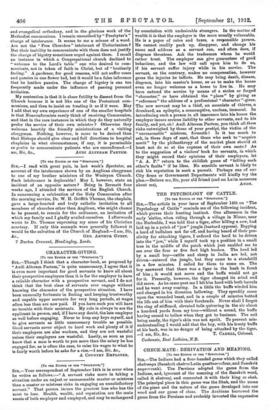[To THE EDITOR OF THR " SPECTATOR."] SIR,—Your correspondent of
September 14th is in error when he writes as follows :—" A servant risks more in taking a situation under an unjust or unreasonable master or mistress than a master or mistress risks in engaging an unsatisfactory servant." That person incurs the greatest loss who has the most to lose. Health, wealth, and reputation are the main assets of both employer and employed, and may be endangered by association with undesirable strangers. In the matter of wealth it is that the employer is the more usually vulnerable. He is a payer of rates and taxes, a responsible person. He cannot readily pack up, disappear, and change his name and address as a servant can, and often does, if disgrace threatens. Ask the tradesman whom he would rather trust. The employer can give guarantees of good behaviour, and the law will call upon him to do so, if his servant suffer injury while in his service. The servant, on the contrary, makes no compensation, however gross the injuries he inflicts. He may bring death, disease, disgrace, into his master's house, so as to make the house even no longer welcome as a home to live in. He may have entered the service by means of a stolen or forged "character," or have obtained the "place" by giving as " reference" the address of a professional " character"-giver. The new servant may be a thief, an associate of thieves, a drunkard, an epileptic, a consumptive, unclean, immoral. In introducing such a person in all innocence into his house the employer incurs serious liability to other servants, and to his family, and yet, oh ! Audi Alteram Partem, you think all these risks outweighed by those of your protogh, the victim of the "unreasonable" mistress, forsooth! Is it too much to ask, in these days of cant, that those who seek to " acquire merit" by the philanthropy of the market place should at least not do so at the expense of their own caste P As to the suggestion of a visitors' book for servants, in which they might record their opinions of their employers, let "A. A. P." return to the childish game of "telling each other's faults" if he likes. No sensible servant is likely to risk his reputation in such a pursuit. Perhaps one of our City firms or Government Departments will kindly try the plan.—Believe me, Sir, your old friend (and no Latin nonsense










































 Previous page
Previous page